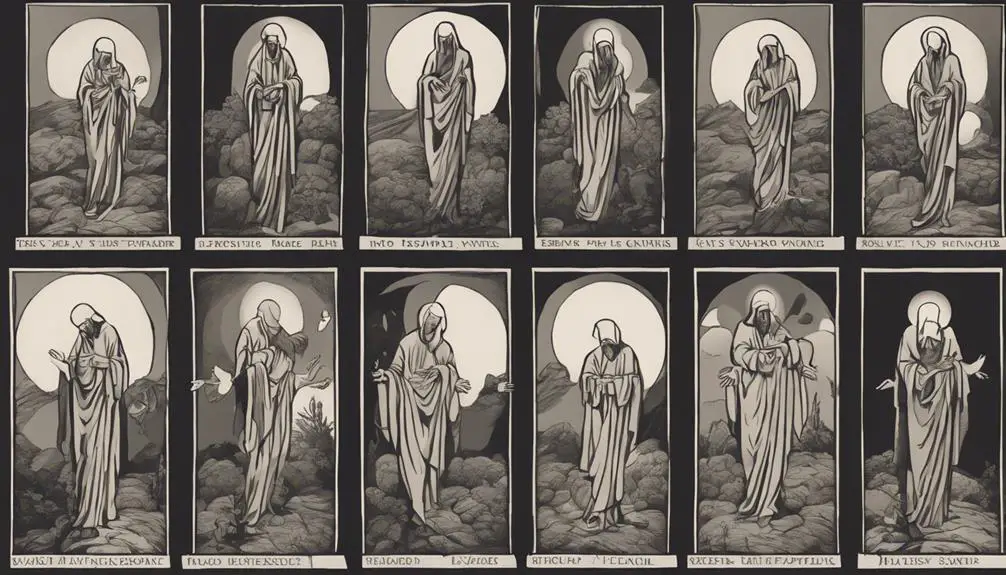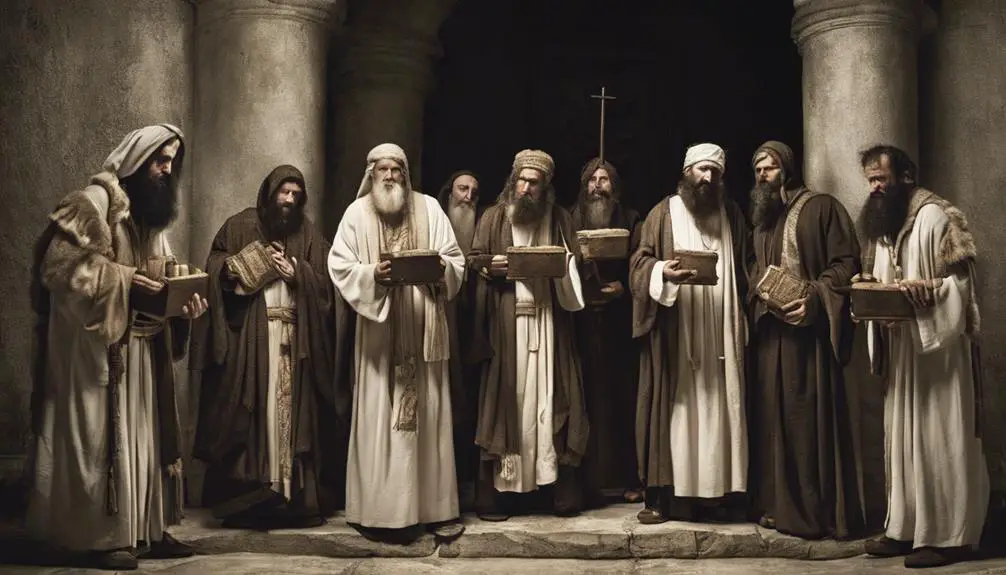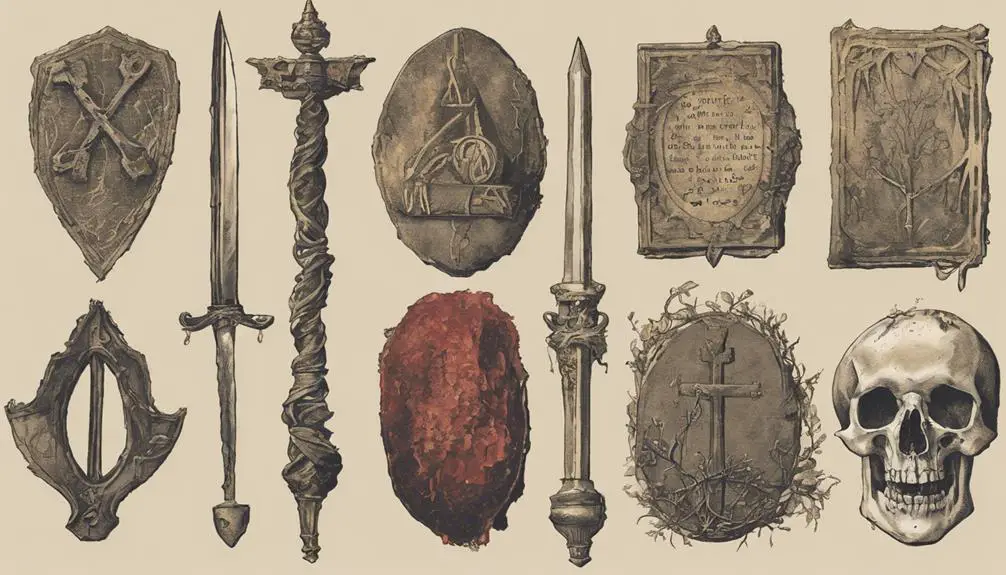Scrutinize the Seven Woes in the Bible, ancient admonitions that echo relevant warnings against human frailties in today's world.

The Seven Woes in the Bible
As you turn the pages of the Bible, you come across a garden of thorns – the Seven Woes. These aren't just denunciations by Jesus against the Pharisees, they're symbolic of human frailties that you might find uncomfortably familiar. They serve as a mirror, reflecting our own imperfections.
Wouldn't you want to understand which behaviors Jesus warns against? Aren't you curious about how these ancient admonitions can still resonate today?
It's interesting how these scriptural thorns can sprout insights that you may find valuable in your life's journey.
Key Takeaways
- The Seven Woes in Matthew 23 highlight Jesus' rebuke of hypocrisy and corruption among religious leaders.
- The Woes were primarily directed at the Pharisees, influential interpreters of the Law of Moses.
- Each Woe addresses a different aspect of religious hypocrisy, from dishonesty to prioritizing outward appearances.
- The Seven Woes remain relevant today, reflecting modern issues like social media hypocrisy and misuse of religion for personal gain.
Understanding the Seven Woes

Before diving into the intricacies of the Seven Woes, it's essential to grasp their fundamental concept and significance in the biblical context. You see, the term 'woe' carries potent symbolism. It's traditionally associated with expressions of deep sorrow, regret, or distress. In the Bible, these 'woes' take on a more critical function, serving as prophetic warnings or condemnations.
Now, let's delve into the Woes' context. They're found within the Gospel of Matthew, specifically in chapter 23. Jesus Christ, the speaker of these woes, addresses them to the scribes and Pharisees, religious leaders of the time. But remember, we'll discuss the Pharisees in the next subtopic.
Understanding the concept of the Seven Woes, you'll find that they highlight the hypocrisy and corruption that had infiltrated religious leadership, a scenario that was far from the ideals of piety and humility they were supposed to uphold. This biblical passage, therefore, serves not only as a historical record but also as a timeless reminder of the potential pitfalls of religious hypocrisy and the importance of genuine faith.
The Pharisees: Woes' Recipients

To fully grasp the Seven Woes' significance, you need to understand who the Pharisees were – the primary recipients of these stern rebukes. The Pharisees were a powerful group in Judea during Jesus' time, profoundly shaping the Jewish community's religious and social landscape. They held considerable influence, which is why understanding the Pharisees' influence is pivotal.
Their role as religious authorities was monumental. They interpreted and taught the Law of Moses, often adding their traditions and interpretations, which sometimes overshadowed the original intent of the Law. Their teachings and practices significantly affected the people's religious life, making them a dominant religious force.
However, their authoritative role and the immense influence they wielded weren't without their drawbacks. They were often critiqued for their rigid adherence to traditions and external rituals, sometimes at the expense of genuine faith and love. This stern critique, encapsulated in the Seven Woes, was primarily directed at them because of their failure to reflect the true heart of the Law. Their influence and role as religious authorities were significant, but it's equally important to remember the context of the Woes – a call for authentic faith and love.
The First Woe: Hypocrisy

Diving into the first of the Seven Woes, you'll encounter a powerful critique of hypocrisy, a flaw that Jesus identified as a major issue within the Pharisees' teachings and behavior. This woe is a stark reminder of the consequences that can ensue when one's actions contradict their professed beliefs.
To better understand this first woe, consider these four aspects:
- Recognition: Recognizing hypocrisy begins with self-awareness. It's about scrutinizing one's actions against their stated principles.
- Consequences: The Bible warns of the dire consequences of hypocrisy – spiritual blindness and misleading others.
- Correction: It encourages honesty and integrity as the antidote to hypocrisy.
- Repentance: A hypocrite can find forgiveness and restoration through repentance and faith in Jesus.
Hypocrisy isn't just a religious issue, it's a human issue that affects all spheres of life. It's a deceptive practice that undermines trust and fosters discord. The first woe serves as a stern warning against such behavior, highlighting the need for consistency between what we profess and how we live. In essence, it's a call towards authenticity, urging you to match your actions with your beliefs.
The Remaining Six Woes

Moving beyond the first woe, the remainder of the Seven Woes – each a profound moral lesson – further demonstrate the importance of integrity and authenticity in religious practice and daily life. These woes, significant in the Biblical context, serve as cautionary tales and guidelines for right living.
The second woe admonishes against prioritizing outward appearance over inward purity. It's not enough to just appear righteous, you must be righteous at heart. The third woe points to the danger of majoring on minors, focusing on insignificant matters while ignoring what truly matters: justice, mercy, and faithfulness.
The fourth woe condemns hypocrisy, the practice of presenting a false image of righteousness while harboring wickedness within. The fifth woe warns against a similar deception, this time in the form of misguided zeal, leading others astray while believing you're leading them towards salvation.
The sixth woe criticizes those who honor prophets yet behave in ways contrary to their teachings. The final woe, the seventh, laments over Jerusalem, symbolizing the stubbornness and hard-heartedness of people who reject God's messengers and their message.
In essence, these woes underscore the need for sincere faith and practice.
Modern Interpretations of the Woes

While these woes hold significant historical and religious value, it's interesting to analyze how they resonate with our modern understanding of ethics and morality. In the age of individualism and relative morality, the Woes' relevance remains undiminished. The Woe symbolism in the Bible often refers to the consequences of unethical actions and attitudes.
Consider the following parallels in contemporary life:
- The first woe: hypocritical behavior can be likened to the false facade often displayed on social media.
- The second woe: greed and self-importance are still prevalent in our society, often leading to exploitation and inequality.
- The third woe: the misuse of religion for personal gain mirrors the abuse of power in many modern institutions.
- The seventh woe: the denial of wrongdoing and lack of repentance is a common trait among the corrupt leaders of our time.
These interpretations underscore the timeless relevance of biblical teachings. They remind us that despite the evolution of societal norms, the fundamental principles of ethics and morality remain constant. So, you see, the 'woes' aren't just ancient warnings but lessons equally applicable in our contemporary world.
Frequently Asked Questions
What Was the Cultural and Historical Context in Which the Seven Woes Were Delivered?
You're delving into a time of religious and political unrest. The Woes were delivered in an era where symbolism and implications were key communication tools.
These Woes, laden with deep symbolic meaning, were a critique of societal norms and hypocrisy. They held implications for both the immediate audience and future generations, serving as a stern warning.
This historical context greatly influenced the delivery and interpretation of the Woes.
Are There Any Examples of the Seven Woes Being Referenced in Other Religious Texts or Traditions?
You're asking if the Seven Woes are referenced in other religious texts or traditions.
While there's no direct mention, comparative theology suggests some parallels.
The Woes' symbolism of moral and spiritual failings is common across religions.
Yet, each tradition interprets these themes differently.
Thus, while specifics mightn't match, you'll find similar warnings and teachings in various religious texts, reflecting universal human concerns about morality and spiritual integrity.
How Have the Interpretations of the Seven Woes Evolved Over Time?
You've asked how interpretations of the seven woes have evolved over time.
It's intriguing to see their depiction in art change along with societal attitudes. Earlier, the focus was more on literal representation, now it's often symbolic.
Similarly, the psychological impact of these woes has shifted from fear to introspection.
This evolution mirrors our changing understanding and handling of adversity.
Are There Any Notable Figures in Religious History Who Have Had Unique Interpretations of the Seven Woes?
Yes, there are several notable figures who've offered unique interpretations of the woes. For instance, Martin Luther, the Protestant Reformation leader, provided a fresh perspective, emphasizing their relevance to everyday life.
Similarly, Pope Francis has discussed the woes, highlighting their moral implications. These interpretations have had significant religious influence, shaping how many view these biblical woes.
It's fascinating to see how these interpretations have evolved and continue to impact religious thought.
Is There a Connection Between the Seven Woes and Other Teachings of Jesus?
Absolutely, there's a connection between the Seven Woes and other teachings of Jesus. The Woe symbolism, a representation of deep sorrow or distress, aligns with Jesus' rhetoric, emphasizing honesty, humility, and love for others.
Many of his teachings echo these themes, calling out hypocrisy and advocating for sincerity in faith. So, you see, the Seven Woes aren't standalone teachings but rather ingrained in the larger framework of Jesus' message.
Conclusion
So, you've journeyed through the seven woes, understanding their profound messages. They're not just warnings for the Pharisees, but timeless lessons for us all.
From the first woe exposing hypocrisy to the remaining six unveiling other transgressions, we're taught how not to live. Modern interpretations continue to find relevance in these woes, highlighting their enduring wisdom.
In essence, these woes aren't just biblical teachings, but a moral guide for life.



Sign up